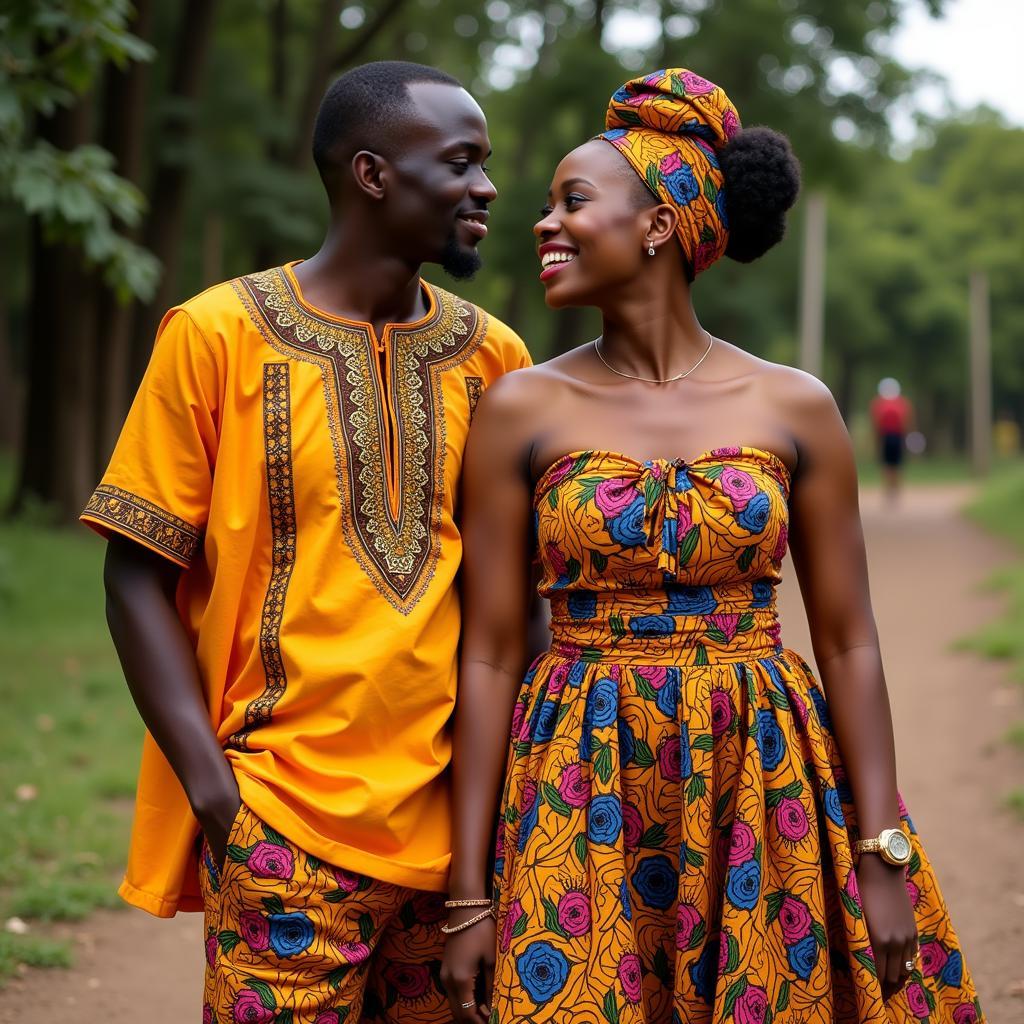Exploring the Rich Heritage of African Brocade Silk Fabric
African Brocade Silk Fabric, a vibrant and luxurious textile, holds a significant place in African culture and fashion. From its intricate designs to its symbolic meaning, this fabric tells a story of artistry, tradition, and heritage. It’s not just cloth; it’s a testament to the rich history and vibrant culture of the African continent. Let’s delve into the captivating world of African brocade silk and uncover its secrets.
A Legacy Woven in Threads: The History of African Brocade Silk
The origins of African brocade silk fabric can be traced back centuries, influenced by trade routes and cultural exchanges. While silk production itself wasn’t indigenous to Africa, the continent embraced the material and transformed it into something uniquely its own. North African countries, with their proximity to the Silk Road, were among the earliest to incorporate silk into their textile traditions. Over time, this influence spread southward, with distinct regional styles and patterns emerging. These patterns often reflect local flora, fauna, and cultural symbols, adding another layer of meaning to the already beautiful textile.
Check out some of the trendy African clothing styles 2019.
The Art of African Brocade: Techniques and Symbolism
The creation of African brocade silk is a labor of love, involving intricate weaving techniques passed down through generations. Often, these techniques involve handlooms and meticulous attention to detail, resulting in the rich, textured fabric that is so admired. The designs themselves are imbued with symbolism, reflecting various aspects of African culture. From geometric patterns representing ancestral spirits to depictions of nature signifying abundance and prosperity, each motif tells a story. This intricate artistry elevates the fabric beyond mere adornment, transforming it into a powerful expression of cultural identity.
From Royalty to Everyday Elegance: Uses of African Brocade Silk
Historically, African brocade silk fabric was often reserved for royalty and special occasions, symbolizing status and prestige. It was used to create elaborate garments for ceremonies, festivals, and other important events. Today, while still highly valued, African brocade silk is more accessible, adorning everything from everyday clothing to home décor. Its use in modern fashion allows individuals to connect with their heritage and express their cultural pride.
Have you seen the latest African bubu styles made with this fabric?
What are the common colors and patterns found in African brocade silk?
Common colors include vibrant hues like gold, royal blue, and deep red, often combined with intricate patterns inspired by nature, geometric shapes, and cultural symbols.
Where can I buy authentic African brocade silk fabric?
Authentic African brocade silk can be purchased from reputable textile merchants specializing in African fabrics, both online and in physical stores, especially in major cities with large African communities.
Caring for Your African Brocade: Preservation and Maintenance
Preserving the beauty of African brocade silk requires proper care. Hand-washing or dry-cleaning is typically recommended to maintain the fabric’s integrity and prevent damage. Proper storage, away from direct sunlight and moisture, will also help to ensure its longevity. By treating this precious textile with care, you are not only preserving a piece of clothing but also a piece of history. You might also be interested in learning about African head wraps and accessories.
How do I identify authentic African brocade silk?
Authentic African brocade silk often has a distinct weight and texture, along with intricate handwoven patterns. Look for consistency in the weave and avoid fabrics with printed designs that mimic the brocade look.
“African brocade is more than just a fabric; it’s a living testament to the creativity and heritage of African artisans.” – Anika Kwame, Textile Historian
Conclusion: A Timeless Treasure
African brocade silk fabric is a testament to the rich tapestry of African culture and artistry. From its historical significance to its modern applications, this exquisite textile continues to captivate and inspire. By appreciating and supporting the craftsmanship behind African brocade silk, we contribute to the preservation of a valuable cultural heritage. Don’t forget to check out these stunning African kaftans online.
FAQ
- What is African brocade silk fabric typically used for? It is used for clothing, accessories, and home décor.
- Is African brocade silk expensive? The price varies depending on the intricacy of the design and the quality of the silk.
- How do I care for African brocade silk? Hand-washing or dry-cleaning is recommended.
- Where can I buy African brocade silk? Textile merchants specializing in African fabrics often carry it.
- What are the different types of African brocade silk? Different regions of Africa have their own unique styles and patterns.
- What is the cultural significance of African brocade silk? It often represents status, prestige, and cultural heritage.
- Is African brocade silk sustainable? Look for ethically sourced and produced fabrics to support sustainable practices.
“The vibrant colors and intricate patterns of African brocade tell stories of generations past and present.” – Adebayo Olajide, Fashion Designer
Scenarios
- Scenario 1: You are looking for a unique fabric to make a special occasion outfit. African brocade silk offers a luxurious and culturally rich option.
- Scenario 2: You want to incorporate African-inspired décor into your home. African brocade silk can be used for cushions, throws, or wall hangings.
- Scenario 3: You are interested in learning more about African textiles and their history. Researching African brocade silk can provide a fascinating glimpse into African culture.
Further Exploration
Explore related articles on African head wrapping for hair.
Need more information about African brocade silk fabric? Contact us at +255768904061, email [email protected], or visit us at Mbarali DC Mawindi, Kangaga, Tanzania. Our customer service team is available 24/7.



